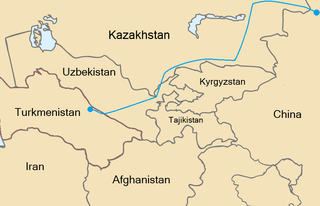Natural gas and petroleum are exported from Turkmenistan by means of a number of existing or proposed pipelines.

Turkmenistan's declaration of "permanent neutrality" was formally recognized by the United Nations in 1995. Former President Niyazov stated that the neutrality would prevent Turkmenistan from participating in multi-national defense organizations, but allows military assistance. Its neutral foreign policy has an important place in the country's constitution. Although the Government of Turkmenistan claims to favour trade with and export to the United States, and Turkey, its single largest commercial partner is China, which buys the vast bulk of Turkmen natural gas via the Central Asia–China gas pipeline. Turkmenistan has significant commercial relationships with Russia and Iran and growing cross-border trade with Afghanistan. The Government of Turkmenistan often appears to use the conflicting interests of these regional powers as a means to extract concessions, especially on energy issues.

Turkmenistan, also known as Turkmenia, is a landlocked country in Central Asia, bordered by Kazakhstan to the northwest, Uzbekistan to the north, east and northeast, Afghanistan to the southeast, Iran to the south and southwest and the Caspian Sea to the west. Ashgabat is the capital and largest city of the country. The population of the country is about 6 million, the lowest of the Central Asian republics. Turkmenistan is one of the most sparsely populated nations in Asia. Citizens of Turkmenistan are known as Turkmenistanis, Turkmenians or Turkmens.

The Turkmenistan–Afghanistan–Pakistan–India (TAPI) Pipeline, also known as Trans-Afghanistan Pipeline, is a natural gas pipeline being developed by the Galkynysh – TAPI Pipeline Company Limited with participation of the Asian Development Bank. The pipeline will transport natural gas from the Galkynysh Gas Field in Turkmenistan through Afghanistan into Pakistan and then to India. Construction on the project started in Turkmenistan on 13 December 2015, work on the Afghan section began in February 2018, and work on the Pakistani section was planned to commence in December 2018. The abbreviation TAPI comes from the first letters of those countries. Proponents of the project see it as a modern continuation of the Silk Road.

The Economic Cooperation Organization or ECO is an Asian political and economic intergovernmental organization that was founded in 1985 in Tehran by the leaders of Iran, Pakistan, and Turkey. It provides a platform to discuss ways to improve development and promote trade and investment opportunities. The ECO is an ad hoc organisation under the United Nations Charter. The objective is to establish a single market for goods and services, much like the European Union. After the dissolution of the Soviet Union, the ECO expanded to include Afghanistan, Azerbaijan, Kazakhstan, Kyrgyzstan, Tajikistan, Turkmenistan, and Uzbekistan in 1992.
Trans-Caspia is an old name for the region lying to the east of the Caspian Sea in Central Asia.
The Afghanistan Oil Pipeline was a project proposed by several oil companies to transport oil from the Caspian region and Central Asia through Afghanistan to Pakistan.
Central Asia Gas Pipeline, Ltd. (CentGas) was a consortium formed in the 1990s to develop a project to build the Trans-Afghanistan Pipeline from Turkmenistan's natural gas fields to Pakistan. The consortium had also considered an extension of the pipeline to the New Delhi area. Regional and political instability proved too great a challenge to overcome and the project eventually was cancelled after Unocal withdrew from the consortium.

The Trans-Caspian Gas Pipeline is a proposed subsea pipeline between Türkmenbaşy in Turkmenistan, and Baku in Azerbaijan. According to some proposals it will also include a connection between the Tengiz Field in Kazakhstan, and Türkmenbaşy. The Trans-Caspian Gas Pipeline project is purposed to transport natural gas from Turkmenistan and Kazakhstan to European Union member countries, circumventing both Russia and Iran. It is also considered as a natural eastward extension of Southern Gas Corridor. This project attracts significant interest since it will connect vast Turkmen gas resources to major consumer geographies as Turkey and Europe.

The Central Asia–China gas pipeline is a natural gas pipeline system from Central Asia to Xinjiang in the People's Republic of China. By connecting Turkmenistan to China’s domestic grid, this pipeline makes it possible to transport gas some 7000 km from Turkmenistan to Shanghai. More than half of Turkmen natural gas exports are delivered to China through the pipeline.

The Central Asia – Center gas pipeline system is a Gazprom controlled system of natural gas pipelines, which run from Turkmenistan via Uzbekistan and Kazakhstan to Russia. The eastern branch includes the Central Asia - Center (CAC) 1, 2, 4 and 5 pipelines, which start from the south-eastern gas fields of Turkmenistan. The western branch consists of the CAC-3 pipeline and a project to build a new parallel Caspian pipeline. The western branch runs from the Caspian Sea coast of Turkmenistan to north. The branches meet in western Kazakhstan. From there the pipelines run to north where they are connected to the Russian natural gas pipeline system.
The Korpeje–Kordkuy pipeline is a 200-kilometre (120 mi) long natural gas pipeline from Korpeje field north of Okarem in western Turkmenistan to Kordkuy in Iran. 135 kilometres (84 mi) of pipeline run in Turkmenistan while 65 kilometres (40 mi) run in Iran.
The Dauletabad Gas Field is a large natural gas field located in Mary, Mary province, Turkmenistan. It is located in the vicinity of the Turkmenistan–Iran border, and is named after the Dowlatabad settlement across the border in Iran. The field is a part of the Amu-Darya oil-gas province.
Caspian pipeline may refer to:

Bridas Corporation is an Argentine independent oil and gas holding company based in Buenos Aires. Since March 2010 it is 50% owned by China National Offshore Oil Corporation.

Carlos Alberto Bulgheroni was an Argentine businessman prominent in the nation's energy sector, and the country's richest man at the time of his death.
The Dauletabad–Sarakhs–Khangiran pipeline is a natural gas pipeline from the Dauletabad gas field in Turkmenistan to Khangiran in Iran, where it is connected with the Iran Gas Trunkline system. It is significant as it allows the diversification of Turkmenistan's gas export routes, doubling the nation's export of gas to Iran. For Iran, the pipeline allows the country to deal with gas shortages in its northern regions, and to improve its reputation as a trade partner in the Caspian region. Gas began pumping on 3 January 2010, and the pipeline was inaugurated in a ceremony in Turkmenistan on 6 January 2010.
Malai is a natural gas field located in Lebap Province of Turkmenistan, on the left bank of Amu Darya River. It has been developed since the 1970s.

The East–West pipeline is a natural gas pipeline in Turkmenistan. It was constructed to carry natural gas from gas fields in eastern Turkmenistan to the coast of Caspian Sea across the southern part of the country.

The list of Turkmenistan-related articles is below
Alejandro Pedro Bulgheroni is an Argentine billionaire businessman in the oil and gas sector. Following his education at the University of Buenos Aires, he joined his father's company, the Bridas Corporation, founded by the Bulgheroni family in 1948. Following expansion by the company, half of it was sold to the Chinese state-run CNOOC Group in 2010. Bulgheroni currently resides in Manantiales, Uruguay. As of March 2022, his net worth is estimated at US$1.9 billion.